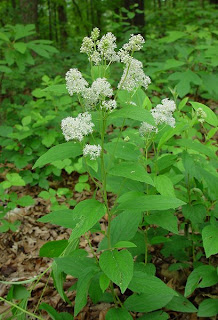ANGELICA

Latin Name: Angelica archangelica
Alternate Names: Archangel, Masterwort, Wild Celery, Root Of The Holy Ghost
Family: APIACEAE
Parts Used: Root, leaves, stem, seeds.
Properties: Anti-inflammatory, Antirheumatic, Aperient, Aromatic, Astringent, Carminative, Diaphoretic, Diuretic, Emmenagogue, Expectorant, Nervine, Stimulant, Stomach Tonic, Tonic, Uterine Stimulant
Internal Uses: Alcoholism, Amenorrhea, Anemia, Anorexia, Arthritis, Asthma, Bronchitis, Colds, Colic, Dysmenorrhea, Expel Placenta, Flatulence, Flu, Indigestion, Intestinal Cramps, Migraine, Nausea, Typhus, Vomiting
Internal Applications: Tea, Tincture, Capsules
The seeds are used for acid indigestion, nausea and vomiting. Angelica is used to strengthen the heart and lungs and improve liver and spleen function. Small amounts stimulate digestive secretions. Some find that when Angelica is used, they lose their taste for alcohol.
The seeds are used for acid indigestion, nausea and vomiting. Angelica is used to strengthen the heart and lungs and improve liver and spleen function. Small amounts stimulate digestive secretions. Some find that when Angelica is used, they lose their taste for alcohol.
Topical Uses: Arthritis, Electric Shock, Motion Sickness, Muscle Soreness
Topical Applications: Poultice, Salve.
Culinary uses: In Iceland and Lapland, the stems are cooked as a vegetable. Stems are candied and made into syrups and jellies, added to fruitcake and used to season fish. Leaves are added to salads and soups. Cook leaves with acidic fruits to decrease the amount of sugar needed. Dried leaves are added to baked goods. The oil from seeds and roots is used in benedictine, chartreuse, vermouth and gin. Leaves have been used to wrap and preserve food when traveling.
Energetics: Sweet, Pungent, Warm, Dry.
Chemical Constituents: Essential oil (beta-phellandrene, pinene, limonene, caryophyllene, linalool), coumarins, macrocyclic lactones, acids (valerianic, angelic), resins, sterol, tannin.
Contraindications: Only use dried root. Large doses can affect blood pressure and respiration, and stimulate the nervous system. Those with diabetes should avoid, since the herb has a high sugar content. Slight possibility that it can increase photosensitivity. Not for overly hot conditions. Avoid during pregnancy and periods of heavy menstrual bleeding. When planting, keep in mind that black flies and fruit flies are attracted to it and will congregate around the plant.
Contraindications: Only use dried root. Large doses can affect blood pressure and respiration, and stimulate the nervous system. Those with diabetes should avoid, since the herb has a high sugar content. Slight possibility that it can increase photosensitivity. Not for overly hot conditions. Avoid during pregnancy and periods of heavy menstrual bleeding. When planting, keep in mind that black flies and fruit flies are attracted to it and will congregate around the plant.
Comments: It is believed that this herb obtained the name Angelica, or angelic herb, as it helped protect people from disease, including plague and poisoning. It also blooms around May 8th, the feast day of Saint Michael, the archangel. It has also been told that the Archangel Raphael appeared to a monk in a dream and told him that Angelica would cure bubonic plague. Angelica is said to attract devic forces.
The common name Angelica also includes the species Angelica atropurpurea and Angelica officinalis, which are used interchangeably with Angelica archangelica.
The common name Angelica also includes the species Angelica atropurpurea and Angelica officinalis, which are used interchangeably with Angelica archangelica.

